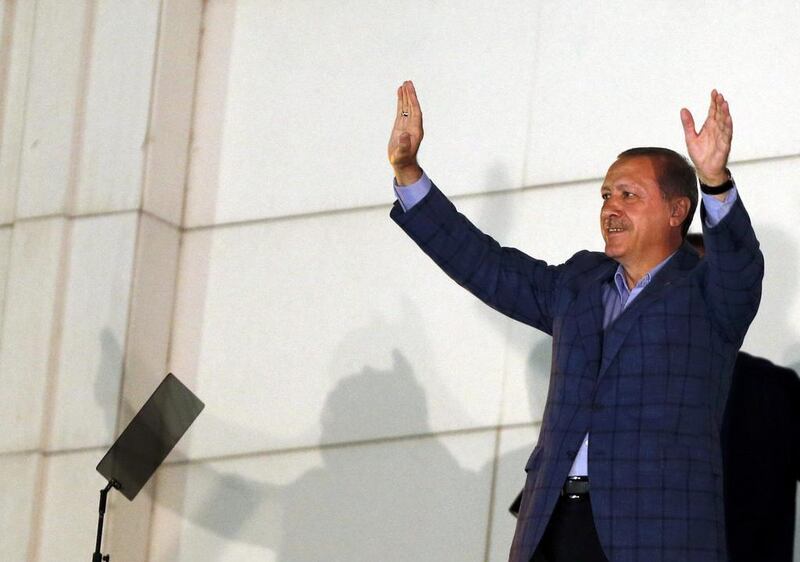In the end, what had felt preordained proved interesting. President-elect and outgoing prime minister Recep Tayyip Erdogan won just under 52 per cent in Turkey's first direct presidential election on Sunday. Though it certainly was a historic win – for the first time, the president has a popular mandate – the margin wasn't as big as some observers had expected.
Mr Erdogan, after all, had all the advantages. He held trump cards in terms of money, mobility and visibility; he had a strong party machine behind him, a loyal segment of the private media, and millions of supporters willing to flock to his blockbuster rallies.
Given the relatively paltry resources of the main opposition candidate, and the little creativity shown in mitigating this, it’s difficult to say that the election was contested in a way that voters deserved.
For years, the opposition has shown its inability to find a workable formula – and that is part of the secret to Mr Erdogan’s success.
When the two main opposition parties jointly nominated Ekmeleddin Ihsanoglu as their presidential candidate, it seemed like a slick move. The two parties, which won a combined 44 per cent in March’s local elections, had found a man with international, national, academic and religious credentials. But the limitations soon became clear. The parties that nominated him did little to support him. Mr Ihsanoglu won 38.5 per cent of the vote, showing the parties’ own constituents did not fully back him. That his name was relatively unknown was made implicitly clear by his campaign planners’ choice of campaign themes. Mr Ihsanoglu’s given name, Ekmeleddin, begins with a sound combination similar to the Turkish word for “bread”. Many of his campaign posters featured pictures of wheat fields accompanied by the odd slogan “For Bread”. Far from political, they looked more like advertisements for, well, bread.
The third candidate Selahattin Demirtas, whose campaign was closely affiliated with the Kurdish national movement, won just 9.8 per cent of the vote, but could claim a better than expected result. His platform, though primarily an expression of nationalist Kurds’ demands and aspirations, made clear something that has been conspicuous for many years: that of all the major parties, the one rooted in the place that is, by many measures, Turkey’s backwater – underdeveloped, under-serviced and even stigmatised – possesses the most progressive platform. It is the most inclusive of women, and is far ahead of its rivals in terms of its policies towards the environment.
But now that Mr Erdogan has won, what about his upcoming term?
The refrain “Not since Atatürk”, has been heard often to forecast Mr Erdogan’s tenure as president. Not since Atatürk will a president wield such power. Not since Atatürk will a president be so transformative. But this is mostly rhetoric and should not be taken too seriously. For one, Mr Erdogan’s image-makers are keen on the comparison. Mr Erdogan has told supporters they are fighting “a new war of independence” – a clear reference to the war of independence won by Atatürk and his nationalist army, which led to the founding of modern Turkey. Portraits of Mr Erdogan (looking all his 60 years) often hang beside portraits of a young Atatürk, dressed in the uniform he wore during his military battles.
But in the end, the idea that Mr Erdogan stands to exert power to a degree comparable to an autocrat who hand-picked his own opposition and utterly transformed Turkey, obscures more than it reveals.
Detractors say that Mr Erdogan has long shown himself to be an autocrat, and that now, as president, he could become a tyrant.This gives rise to the other ubiquitous and unhelpful analogy that Mr Erdogan is styling himself a sultan – but we would do well to favour real analysis over dramatic historical analogies.
Mr Erdogan and his political machine are both thoroughly modern, and as able as any other modern political machine to deploy sophisticated, well-organised, disingenuous and cynical methods, including demagoguery, spin, polling and gerrymandering to win votes. (Mr Erdogan can also boast real economic achievements, however problematic.) All this is a much different from the situation faced by Atatürk or any sultan.
At the same time, concerns over Mr Erdogan’s potential power are not misplaced. Until 2007, the president provided powerful checks and balances on Turkish governments. With the army at his back, the president was the highest representative of the state, a backstop against elected lawmakers. This is why it is wrong to say that the president’s role is largely ceremonial. This has never been the case.
The Turkish president has always appointed key officers of the state, including judges, and chaired the National Security Council, a body that competes with the cabinet in terms of relative power and policy consequence. This is one reason that the Turkish parliament’s elevation of Abdullah Gül, then the foreign minister, to the presidency in 2007 precipitated the army implicitly threatening a coup.
With Mr Erdogan as president, the state will become even more identified with the government – presuming of course that the AKP party stays in power and Mr Erdogan continues to control the AKP through informal and indirect means. (The law requires a president to sever any party ties before inauguration.) As long as the AKP remains in power under Mr Erdogan, the government and the state will be closer than they’ve been since the end of military rule in the early 1980s.
It is almost certain that whoever is named prime minister to take Mr Erdogan’s place will be a loyal caretaker. This means a fundamental check has, for all practical purposes, evaporated.
The constitutional logic of the office of president has not been changed to absorb the fact the president now has a popular mandate, as does the parliament. How all this power is going to be made to fit and function is going to be the political story of Turkey’s next few months.
Caleb Lauer is a freelance journalist who covers Turkey





